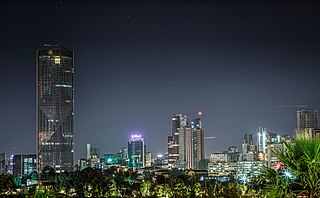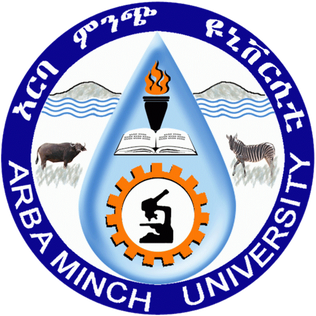Related Research Articles

Addis Ababa is the capital and largest city of Ethiopia. In the 2007 census, the city's population was estimated to be 2,739,551 inhabitants. Addis Ababa is a highly developed and important cultural, artistic, financial and administrative centre of Ethiopia.

The president of Ethiopia is the head of state of Ethiopia. The position is largely ceremonial with executive power vested in the Council of Ministers chaired by the prime minister. The current president is Sahle-Work Zewde, who took office on 25 October 2018. Presidents are elected by the Federal Parliamentary Assembly for six years.

The flag of Ethiopia is the national flag of Ethiopia. It consists of a green, yellow, and red tricolour with the national emblem, a golden pentagram on a blue disc, superimposed at the center. While the colors green, yellow, and red in combination held symbolic importance since at least the early 17th century, the modern tricolour was first adopted on 11 October 1897 by Menelik II, and the present flag on 31 October 1996.

The languages of Ethiopia include the official languages of Ethiopia, its national and regional languages, and a large number of minority languages, as well as foreign languages.

According to the U.S. Department of State's human rights report for 2022, there exists "significant human rights issues" in Ethiopia. In addition to extrajudicial killings and instances of "enforced disappearance", other human right issues in Ethiopia include arbitrary arrest, the censorship and unjustified arrests of journalists, the use of child soldiers, and more.

Hawassa University (HU) (Amharic: ሀዋሳ ዩኒቨርሲቲ) is a residential national university in Hawassa, Sidama Region, Ethiopia. It is approximately 278 kilometres (173 mi) south of Addis Ababa, Ethiopia. The Ministry of Science and Higher Education admits qualified students to Hawassa University based on their score on the Ethiopian Higher Education Entrance Examination (EHEEE).

Arba Minch University is a residential national university in Arba Minch, Southern Nations, Nationalities, and Peoples' Region, Ethiopia. It is approximately 435 kilometres (270 mi) south of Addis Ababa, Ethiopia. The Ministry of Education admits qualified students to Arba Minch University based on their score on the Ethiopian Higher Education Entrance Examination.

The Transitional Government of Ethiopia (TGE) was an era established immediately after the Ethiopian People's Revolutionary Democratic Front (EPRDF) seized power from the Marxist-Leninist People's Democratic Republic of Ethiopia (PDRE) in 1991. During the transitional period, Meles Zenawi served as the president of the TGE while Tamrat Layne was prime minister. Among other major shifts in the country's political institutions, it was under the authority of the TGE that the realignment of provincial boundaries on the basis of ethnolinguistic identity occurred. The TGE was in power until 1995, when it transitioned into the reconstituted Federal Democratic Republic of Ethiopia that remains today.

Adigrat University is a residential national university in Adigrat, Tigray Region, Ethiopia. It is approximately 900 kilometres (560 mi) north of Addis Ababa, Ethiopia. The Ministry of Education admits qualified students to Adigrat University based on their score on the Ethiopian Higher Education Entrance Examination (EHEEE). Facilities at the university's campuses were "completely destroyed" during the Tigray War.
Ambo University is a national university in Ambo, Oromia Region, Ethiopia. It is approximately 119 kilometres (74 mi) west of Addis Ababa, Ethiopia. The Ministry of Education admits qualified students to Ambo University based on their score on the Ethiopian Higher Education Entrance Examination (EHEEE). Ambo University was established on 11 May 2011 by government proclamation.

The Tigray War was an armed conflict that lasted from 3 November 2020 to 3 November 2022. The war was primarily fought in the Tigray Region of Ethiopia between forces allied to the Ethiopian federal government and Eritrea on one side, and the Tigray People's Liberation Front (TPLF) on the other.
The Ethiopian Human Rights Commission (EHRC) is a national human rights institution (NHRI) established by the Ethiopian government. The EHRC is charged with promoting human rights and investigating human rights abuses in Ethiopia. The EHRC states organizational independence as one of its values. In October 2021, the EHRC's rating by the Global Alliance of National Human Rights Institutions for operation in accordance with the UN Paris Principles was upgraded from grade B to grade A.

Azerbaijan–Ethiopia relations refer to bilateral relations between Azerbaijan and Ethiopia. Cooperation is carried out in such areas as economy, trade, education, culture, media, engineering, energy, and medicine. Azerbaijan has an embassy in Addis Ababa. Ethiopia has a non resident ambassador in Ankara.
The Ethiopian Reconciliation Commission is a truth and reconciliation commission created in Ethiopia in December 2018.
The Federal Judicial Administration Council (FJAC) is an Ethiopian quasi-judicial body that adjudicates and ensures separation of powers of state and federal courts in the judicial system of Ethiopia. Under Article 55(1) of FDRE Constitution, the FJAC manages federal courts and judges and non-judicial personnels working with federal courts.

The Ethiopian National Educational Assessment and Examination Agency is a government agency responsible for conducting and inspection of national learning process of grade 4th and 8th since 2000, and grade 8th and 12th since 2010. It was established by Council of Ministers under Proclamation No.260/2012. Its office is located in King George VI Street, in Arada district of Addis Ababa.

The Addis Ababa Federal Police is the law enforcement division of the Ethiopian Federal Police operating in Addis Ababa City Administration. Established in 2003 by Proclamation of Council of Ministers No.96/2003, it has the main duty of safeguard public security and peace and comply to the Constitution and the law of the country by preventing crimes. It is administered by the Addis Ababa City Administration Police Commission, which is responsible to the Federal Police Commission of Ethiopia.

The Federal First Instance Court is the first-level court division in Ethiopia. The FDRE Constitution delegates judicial jurisdiction to the First Instance Court, along with the High Court and State Courts. It is headquartered in Addis Ababa in Kirkos district, with expectations of expanding new branches in all districts of Addis Ababa.

The Federal High Court of Ethiopia is the second-level court division in Ethiopia. The FDRE Constitution delegates judicial jurisdiction to the Federal High Court, along with the First Instance and State Courts. It has its headquarters in Addis Ababa's Lideta district.
References
- ↑ Yusuf, Abdulkader M.; Fitiwi, Mahlet (2017-09-21). "Compendium of key environmental laws of Ethiopia" (PDF). Forum on Environment . Archived (PDF) from the original on 2020-12-26. Retrieved 2020-12-26.
- ↑ "Federal Negarit Gazeta" (PDF). Federal Supreme Court of Ethiopia . 1995-08-22. Archived (PDF) from the original on 2019-11-04. Retrieved 2020-12-26.